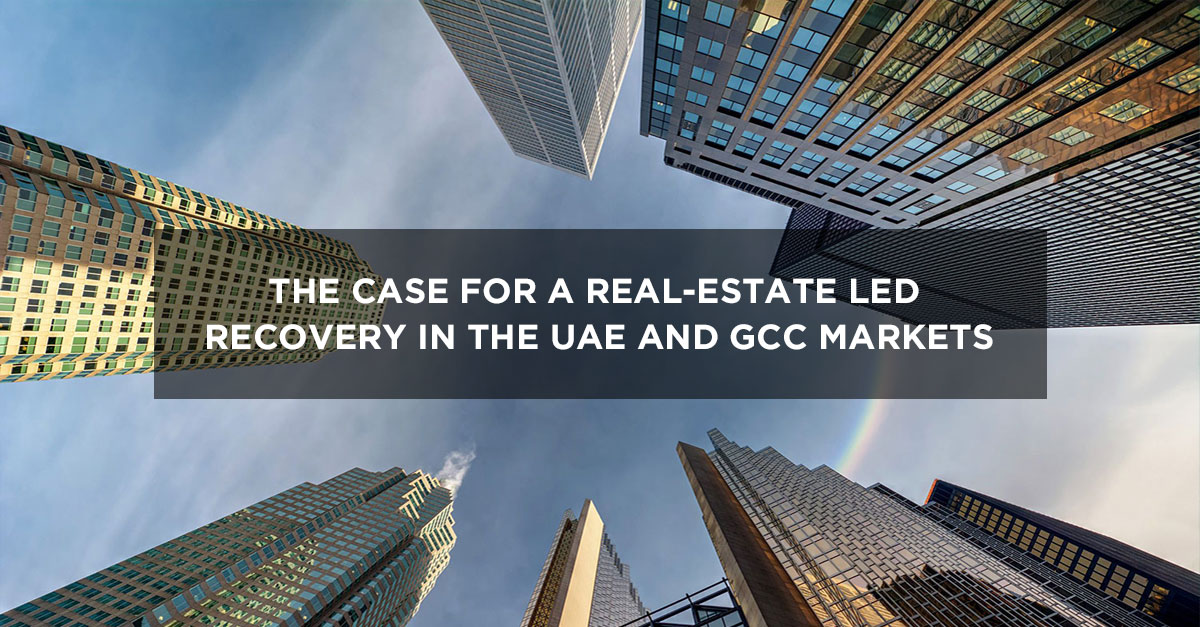The case for a real-estate led recovery in the UAE and GCC markets
The real estate sector is a significant contributor to the UAE economy. How significant? In an annual report(1) issued by the Dubai Land Department in September 2019, the industry’s contribution to the UAE’s GDP was pegged at 13.6%. In fact, just before the pandemic brought all economic activity to a halt, the UAE real estate sector had begun to experience a turnaround from a relative lull, in recent years. After a few quarters of consistent growth, a general optimism around had begun to sublimate into a resurgent market sentiment.
Fortunately, despite the fact that the break in this positive momentum was far from ideal, most of the strengths driving the revival seem to be continuing to have a positive impact, in the new normal. In fact, the real estate sector is attracting considerable attention, as experts strategize around the post-COVID reopening of the Emirati economy.
Getting back on track: challenges and opportunities
To gain an understanding of how a real-estate led recovery in the UAE and GCC markets can be best initiated, we need to first understand where things stand, in the aftermath of COVID-19. As huge sections of the global population was reduced to ‘sheltering in place’, under government mandated lockdowns, many activities that commercial real estate facilitates came to a sudden and complete stop. The hospitality industry shut down virtually completely, malls and retail were heavily restricted, and a high proportion of office spaces remained under lock and key, for months.
While the impact of the restrictions may seem like a devastating ‘death-blow’, to any notion of resurgence, a more nuanced look reveals several avenues for expansion. The key to reviving the real estate sector, and using that revival to fuel larger economic momentum, are the measures being taken to adapt to the ‘new normal’. For one thing, the relatively lower rates of infection and COVID related fatalities in the GCC, have led to a fairly steady reopening of public spaces with some restrictions, including offices and retail. While such commercial spaces may still be operating at lower than pre-pandemic footfall, innovative strategies are allowing their operators to remain afloat – unlike in many other parts of the world.
As far as the residential segment of the industry is concerned, a combination of safety concerns, lucrative pricing and government incentives might actually convince more first-time home buyers to take the plunge. Dubai, which is probably one of the most dynamic real estate markets anywhere on the globe, and certainly a regional star, is experiencing a set of conflicting market stimuli, in this segment. On the one hand the market supply of residential properties is continuously growing. However price softening, attractive rebates for first time buyers, and new visa regulations which give the city’s huge expat community more incentive to purchase rather than rent, are likely to drive a rise in transactions(2).
A technology and infrastructure led revival
One of the defining trends, in recent government initiatives across the GCC countries, has been an emphasis on the deployment of people-centric tech initiatives. In particular, the United Arab Emirates and the Kingdom of Saudi Arabia have launched several pathbreaking projects, which are re-setting benchmarks in futuristic infrastructure. Fortunately, many of these initiatives are a perfect fit for the requirements of the post-COVID new normal.
Unified, IoT and AI enabled management of smart cities, driverless public transport, app initiated ‘touchless’ user interfaces, and many other such innovations are an intrinsic part of the many recent showcase projects in the region. And this tech-oriented evolution is not restricted to the initiative of private enterprises alone. Both the KSA’s ‘Vision 2030(3)’ and the UAE’s ‘Vision 2021(4)’, feature a string emphasis on technology.
While smart city initiatives have made headlines for more than a decade, the post pandemic scenario represents the perfect coming together of opportunity and innovation. A recent surge in the development of digital-retrofitting solutions, with the capability to turn existing buildings into ‘smart’ infrastructure, is unlocking new value in the real estate industry. Implementing this next generation of infrastructure, which is ideal for addressing the challenges of the ‘new normal’, will result in a major new market-segment in real estate. This agile, real-time and responsive new model of real estate will redefine urban societies, and the GCC countries are already at the forefront of this transformation, with close to 30 ‘megaprojects’ currently in the pipeline(5), in the region.
Leveraging dynamism and a capacity to ‘think-big’
The UAE real estate developer community has gained a well-deserved reputation for creating built spaces which are unique in the world. Whether it is staggering man made islands, the tallest building in the world, the largest mall in the world, indoor ski-slopes or an underwater zoo, nothing seems beyond them. This capacity to think beyond the norm is a priceless commodity in the post-COVID new normal. It is could also be the key to a real estate led economic recovery, in the UAE and the GCC region.




